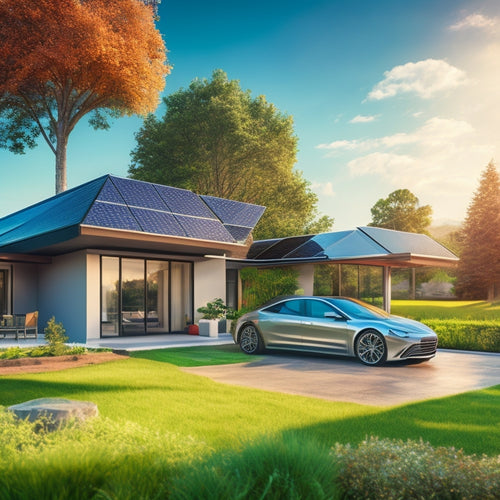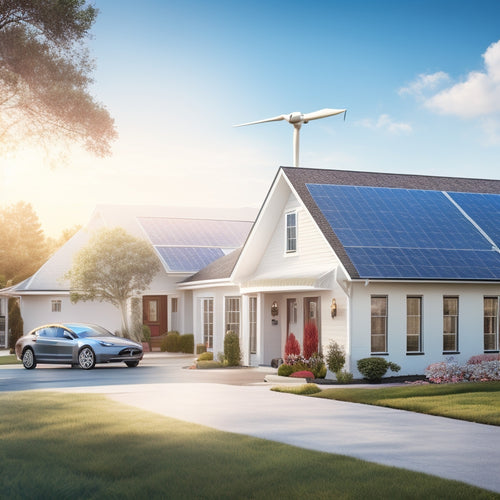
Best Solar Panels to Install for Maximum Energy Savings
Share
When installing solar panels to maximize energy savings, you'll want to choose top-rated brands with high-efficiency cells, maximum power output, and extensive warranties. Look for panels with low temperature coefficients, high weather resistance ratings, and corrosion-resistant materials to guarantee durability. Cost-effective options with affordable financing, government incentives, and high-efficiency ratings can help you save more. Proper installation, regular maintenance, and compatible inverter types are also essential. By considering these factors, you'll be well on your way to optimizing your energy savings - and learning about the subtleties of MPPT technology and system configuration can further enhance your returns.
Key Takeaways
- High-efficiency solar panels with ratings above 20% convert sunlight into energy more effectively, maximizing energy savings.
- Durable and weather-resistant panels with strong warranties ensure long-term performance and minimize maintenance costs.
- Quality inverters with maximum power point tracking (MPPT) technology optimize energy extraction and adapt to varying conditions.
- Corrosion-resistant materials, waterproof coatings, and low temperature coefficients ensure panels operate efficiently in harsh environments.
- Comprehensive warranties, government incentives, and cost-effective financing options help reduce upfront installation costs and enhance investment protection.
Top-Rated Solar Panel Brands
Several top-rated solar panel brands stand out from the rest, offering exceptional quality, efficiency, and reliability. When you're investing in solar panels, you want to guarantee you're getting the best. A brand's reputation plays a significant role in determining the quality of their products.
You should look for brands with a strong reputation in the industry, backed by certifications and compliance with international standards. Customer reviews are also an essential factor to take into account. You'll get a sense of how well a brand's solar panels perform in real-world scenarios.
Look for reviews that highlight the panels' performance, durability, and maintenance requirements. A brand with a high overall rating and a large number of reviews is likely to be a safe bet. Additionally, check if the brand offers thorough warranties and dedicated customer support.
Efficiency and Power Output Matters
Maximizing energy savings with solar panels requires careful consideration of efficiency and power output.
You want to verify that your solar panel system is converting sunlight into electricity at the highest possible rate. Efficiency refers to the percentage of sunlight that's converted into usable energy, while power output measures the actual amount of electricity generated.
When evaluating solar panel technologies, look for the following key factors:
-
High-efficiency cells: Look for panels with high-efficiency cells that can convert sunlight into electricity at rates above 20%.
-
Maximum power output: Choose panels with high power output ratings to maximize your energy generation.
-
Energy conversion efficiency: Opt for panels with high energy conversion efficiency to minimize energy loss during conversion.
- Low temperature coefficient: Select panels with low temperature coefficients to guarantee peak performance even in high-temperature conditions.
Durability and Weather Resistance
You'll want to guarantee your solar panels can withstand harsh outdoor conditions, so it's crucial to take into account their durability and weather resistance.
Specifically, look for panels that can operate within a wide temperature range, typically between -40°C to 85°C, and are designed with water and dust resistance in mind.
Additionally, corrosion-resistant materials will help extend the lifespan of your solar panels.
Extreme Temperature Tolerance
When solar panels are exposed to extreme temperatures, their performance and lifespan can suffer. As you consider the best solar panels for your energy needs, it's crucial to evaluate their temperature performance. High temperatures can lead to a considerable heat impact, reducing the panel's efficiency and overall energy output.
To guarantee you get the most out of your solar panel system, look for panels with the following features:
-
High temperature coefficient: A low temperature coefficient guarantees that your panels' performance doesn't degrade considerably in hot temperatures.
-
Heat-resistant materials: Panels built with heat-resistant materials, such as anodized aluminum frames, can withstand extreme temperatures without compromising their performance.
-
Efficient cooling systems: Some panels feature built-in cooling systems, such as ventilation channels or heat sinks, to dissipate heat more efficiently.
- Temperature testing and certification: Opt for panels that have undergone rigorous temperature testing and have been certified by reputable organizations, such as the International Electrotechnical Commission (IEC).
Water and Dust Resistance
Exposure to water and dust is a harsh reality for solar panels, which can lead to corrosion, electrical shorts, and reduced energy output. You need solar panels that can withstand these elements to guarantee maximum energy savings.
Look for panels with waterproof coatings that prevent water ingress and minimize the risk of electrical shorts. These coatings create a hydrophobic surface, allowing water to roll off easily and reducing the likelihood of water accumulation.
Dust is another common issue that can reduce your solar panel's energy output. You'll want panels with a smooth, flat surface that allows for easy dust cleaning. Some panels feature a self-cleaning coating that uses rainwater to remove dust and debris, maximizing energy production.
When selecting solar panels, prioritize those with high water and dust resistance ratings. This will assure you're getting the most energy output from your investment.
Corrosion-Resistant Materials
Five key components of a solar panel's durability are its corrosion-resistant materials, which guarantee the panel can withstand harsh weather conditions and last for decades.
You want to ascertain that your solar panel system can resist corrosion, as it's vital for material longevity and overall performance.
Here are four essential corrosion-resistant materials to look for in your solar panels:
-
Anodized aluminum frames: Provide exceptional corrosion resistance and can withstand exposure to saltwater, acidic rain, and other harsh environmental conditions.
-
Stainless steel clamps: Offer superior corrosion resistance and can securely hold the panels in place, even in extreme weather conditions.
-
Copper-free connectors: Eliminate the risk of copper-induced corrosion, guaranteeing a reliable and long-lasting connection.
- UV-resistant backsheet materials: Protect the solar cells from degradation caused by UV radiation, guaranteeing peak energy production throughout the panel's lifespan.
Cost-Effective Solar Panel Options
Many homeowners seeking to switch to renewable energy are drawn to cost-effective solar panel options, as they offer a more affordable entry point into the world of solar power.
You can investigate affordable financing options, such as solar loans or power purchase agreements, to reduce the upfront costs of installation. Additionally, government incentives like the Solar Investment Tax Credit (ITC) can help offset the expense.
When evaluating cost-effective solar panel options, you'll want to take into account the module efficiency, durability, and warranty offered by each manufacturer.
Look for panels with high-efficiency ratings (above 20%) and durable materials that can withstand environmental stressors. A longer warranty period (25 years or more) can also provide peace of mind and protect your investment.
Installation and Maintenance Factors
The installation process itself is an essential factor to take into account when evaluating cost-effective solar panel options.
You'll want to reflect on the installation techniques used, as they can notably impact the system's overall performance and energy output. For instance, a well-designed installation can maximize energy production by optimizing panel angle and orientation.
To guarantee your solar panel system operates at peak efficiency, you should also prioritize regular maintenance.
Here are some key factors to contemplate:
-
Maintenance schedules: Regular cleaning and inspection can help prevent energy losses and identify potential issues before they become major problems.
-
Installation quality: A poorly installed system can lead to reduced energy output, safety hazards, and even void your warranty.
-
System monitoring: Real-time monitoring allows you to track your system's performance and identify areas for improvement.
- Warranty and support: Look for manufacturers that offer thorough warranties and dedicated customer support to make sure you're covered in case anything goes wrong.
Inverter Type and Compatibility
By the time you've considered installation and maintenance factors, it's essential to turn your attention to the inverter type and compatibility, as these components play a significant role in converting the DC power generated by your solar panels into usable AC electricity for your home.
When selecting an inverter, you'll need to decide between string inverters, microinverters, and power optimizers. String inverters are the most common type, converting DC power from a string of panels into AC electricity. Microinverters, on the other hand, convert DC power at the individual panel level, providing more granular control and monitoring capabilities. Power optimizers offer a hybrid approach, combining the benefits of string and microinverters.
Inverter sizing is also important, as undersizing can lead to energy losses, while oversizing can result in wasted investment. Verify that your inverter is compatible with your solar panel array's voltage and current output.
Additionally, consider the inverter technology's maximum power point tracking (MPPT) capabilities, which enhance energy harvesting by identifying the best operating point for your solar panels. By choosing the right inverter type and verifying proper sizing and compatibility, you can maximize your energy savings and get the most out of your solar panel investment.
Frequently Asked Questions
Can I Install Solar Panels on a Metal or Tile Roof?
You can install solar panels on a metal or tile roof, but metal roof installation requires specialized clamps and brackets, while tile roof considerations involve ensuring waterproofing and avoiding tile damage during installation.
Do Solar Panels Work During Power Outages?
During the 2018 Hawaiian hurricane, a Maui resident's solar panel system, paired with a Tesla Powerwall, kept their home powered for 12 hours during an outage, illustrating that, with energy storage, you can utilize solar panel functionality even when the grid goes down.
Are Solar Panels Noisy or Disruptive?
You'll find that solar panels operate quietly, with no moving parts, ensuring minimal disruption to your daily life. Their silent operation also contributes to a reduced environmental impact, allowing you to maximize solar panel efficiency while keeping the noise level down.
Can I Install Solar Panels Myself or Diy?
You can attempt a DIY solar panel installation, but it's essential to take into account the complexity of DIY solar systems, requiring precise electrical and roofing knowledge to guarantee a safe and efficient solar panel installation.
Are There Any Government Incentives for Solar Panels?
Don't worry about the upfront cost; you'll recoup it with government incentives. You're eligible for federal tax credits, covering up to 26% of your solar panel system's cost, and state rebates, which vary by location, to maximize your energy savings.
Related Posts
-

What Solar Panels Work Best With EVS Online?
When shopping for solar panels online to power your electric vehicle, look for high-efficiency models that can withst...
-

Why Electric Motorcycles Fail at Long-Distance Touring
You're likely familiar with the excitement of hitting the open road on an electric motorcycle, but you're also smart ...
-

Why Homeowners Are Embracing DIY Energy Independence
By taking control of your energy needs, you're breaking free from the uncertainty of utility bills and embracing a se...


